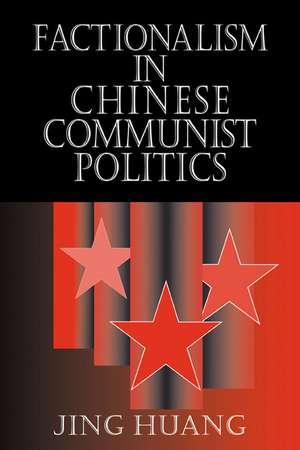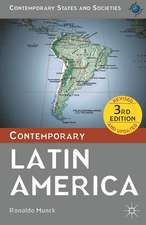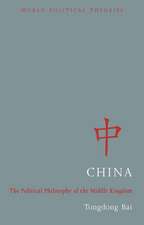Factionalism in Chinese Communist Politics: Cambridge Modern China Series
Autor Jing Huangen Limba Engleză Paperback – 22 noi 2006
| Toate formatele și edițiile | Preț | Express |
|---|---|---|
| Paperback (1) | 358.37 lei 6-8 săpt. | |
| Cambridge University Press – 22 noi 2006 | 358.37 lei 6-8 săpt. | |
| Hardback (1) | 861.97 lei 6-8 săpt. | |
| Cambridge University Press – 2 iul 2000 | 861.97 lei 6-8 săpt. |
Din seria Cambridge Modern China Series
-
 Preț: 284.81 lei
Preț: 284.81 lei -
 Preț: 279.56 lei
Preț: 279.56 lei -
 Preț: 284.81 lei
Preț: 284.81 lei -
 Preț: 284.59 lei
Preț: 284.59 lei -
 Preț: 320.70 lei
Preț: 320.70 lei -
 Preț: 278.87 lei
Preț: 278.87 lei -
 Preț: 285.78 lei
Preț: 285.78 lei - 11%
 Preț: 690.48 lei
Preț: 690.48 lei -
 Preț: 286.53 lei
Preț: 286.53 lei -
 Preț: 325.41 lei
Preț: 325.41 lei -
 Preț: 318.80 lei
Preț: 318.80 lei -
 Preț: 335.75 lei
Preț: 335.75 lei -
 Preț: 324.14 lei
Preț: 324.14 lei -
 Preț: 391.40 lei
Preț: 391.40 lei -
 Preț: 421.93 lei
Preț: 421.93 lei -
 Preț: 253.95 lei
Preț: 253.95 lei -
 Preț: 251.02 lei
Preț: 251.02 lei -
 Preț: 318.97 lei
Preț: 318.97 lei -
 Preț: 282.91 lei
Preț: 282.91 lei -
 Preț: 329.42 lei
Preț: 329.42 lei -
 Preț: 285.19 lei
Preț: 285.19 lei -
 Preț: 285.78 lei
Preț: 285.78 lei -
 Preț: 353.94 lei
Preț: 353.94 lei -
 Preț: 241.70 lei
Preț: 241.70 lei
Preț: 358.37 lei
Nou
Puncte Express: 538
Preț estimativ în valută:
68.63€ • 70.71$ • 57.49£
68.63€ • 70.71$ • 57.49£
Carte tipărită la comandă
Livrare economică 24 februarie-10 martie
Preluare comenzi: 021 569.72.76
Specificații
ISBN-13: 9780521032582
ISBN-10: 052103258X
Pagini: 480
Ilustrații: 15 b/w illus. 15 tables
Dimensiuni: 151 x 228 x 27 mm
Greutate: 0.7 kg
Editura: Cambridge University Press
Colecția Cambridge University Press
Seria Cambridge Modern China Series
Locul publicării:New York, United States
ISBN-10: 052103258X
Pagini: 480
Ilustrații: 15 b/w illus. 15 tables
Dimensiuni: 151 x 228 x 27 mm
Greutate: 0.7 kg
Editura: Cambridge University Press
Colecția Cambridge University Press
Seria Cambridge Modern China Series
Locul publicării:New York, United States
Cuprins
List of figures and tables; Preface; List of abbreviations; Introduction; 1. Factionalism, the puzzle of Chinese communist politics; 2. Factionalism and the political system in China; 3. The establishment of the Yan'an round table; 4. The transition of the Yan'an round table; 5. Crises in leadership relations with the two-front arrangement; 6. The collapse of the Yan'an round table and the unleashing of factionalism; 7. Deng Xiaoping's dominance: factionalism prevails over the party spirit; 8. Conclusion; Selected bibliography; Index.
Recenzii
'… a fascinating book.' The Journal of Politics
'A highly original and insightful analysis which debunks many conventional wisdoms about FDI 's role in China's development. Huang demonstrates why a substantial part of the colossal FDI inflows since the early 1990s is more readily explained by deficiencies in China's institutions and domestic financial intermediation, than by the attractiveness of its investment regime. He points out that much FDI went into traditional labor-intensive industries in China, often sidelining private domestic entrepreneurs. He also shows how FDI influenced China's broader reform strategy and process in positive ways. Indispensable reading for the serious student of China's economic transition.' Pieter Bottelier, former representative of the World Bank in China and adjunct lecturer at Kennedy School of Government, Harvard University
'Huang's level of detail and ability to investigate 'sensitive' issues is unrivalled; … there is no denying the richness of evidence that this volume presents. It is a star example of the ability that now exists for 'normalizing' CCP political history through knowledge and refinement of interpretation. Jing Huang's book not only presents us with a new way of looking at conflicts within Chinese Communism, but also, and perhaps more importantly, shows younger scholars how the patient attention to facts may crack what may once seemed the most impenetrable of historical vaults.' Journal of Cold War History
'A highly original and insightful analysis which debunks many conventional wisdoms about FDI 's role in China's development. Huang demonstrates why a substantial part of the colossal FDI inflows since the early 1990s is more readily explained by deficiencies in China's institutions and domestic financial intermediation, than by the attractiveness of its investment regime. He points out that much FDI went into traditional labor-intensive industries in China, often sidelining private domestic entrepreneurs. He also shows how FDI influenced China's broader reform strategy and process in positive ways. Indispensable reading for the serious student of China's economic transition.' Pieter Bottelier, former representative of the World Bank in China and adjunct lecturer at Kennedy School of Government, Harvard University
'Huang's level of detail and ability to investigate 'sensitive' issues is unrivalled; … there is no denying the richness of evidence that this volume presents. It is a star example of the ability that now exists for 'normalizing' CCP political history through knowledge and refinement of interpretation. Jing Huang's book not only presents us with a new way of looking at conflicts within Chinese Communism, but also, and perhaps more importantly, shows younger scholars how the patient attention to facts may crack what may once seemed the most impenetrable of historical vaults.' Journal of Cold War History
Descriere
In this book, first published in 2000, Jing Huang examines factionalism's role in leadership relations and policy-making in Chinese communist politics.













